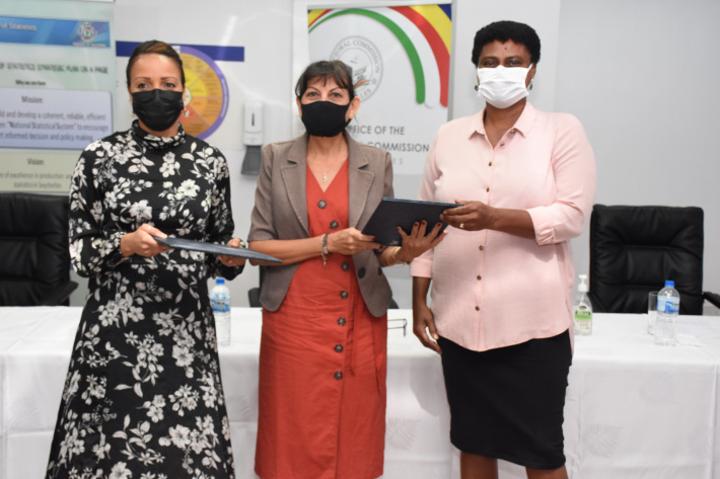Africa-Press – Seychelles. This year’s voters’ census will be done by the National Bureau of Statistics together with the population and housing census.
This was announced yesterday after the Electoral Commission revealed during a joint press conference at its headquarters at the Orion Mall that it has commissioned the National Bureau of Statistics (NBS) in accordance to section 7 of the Elections Act in the performance of its duty the obligation to conduct the voters’ census at five-year intervals.
The notice containing the dates and period will be published in the Official Gazette as soon as they have been identified.
Electoral Commission’s (EC) chief electoral officer Manuela Amesbury, National Bureau of Statistics’ (NBS) chief executive Laura Ahtime, Electoral Commission board chairperson Danny Lucas, census commissioner at NBS Helena Butler-Payette, and EC’s chief registration officer Wilfred Uranie were all present for the press conference.
Yesterday the two parties formally signed and the exchanged the necessary documents for the 2022 voters’ census to be conducted in concurrence with the population and housing census.
“The modality to conduct this census will be left to the NBS. After the census, within six months, we will provide the data collected. Chapter 1 A of schedule 3 of the Election Act, clearly specifies how the data collected will be used for the purpose of revising the voters’ register. Information collected from the census will also be used as a first phase for the delimitation of boundaries,” said Mrs Amesbury.
“With regard as to how we will be working, the NBS will be solely responsible to conduct the exercise and the commission will not interfere in any way,” noted Ms Amesbury.
Modality of census
Mrs Butler-Payette explained that the NBS already had pending the population and housing census.
“This exercise was supposed to be conducted in 2020, but due to the Covid-19 pandemic, it was not done. If everything goes well, this year we will do the census. This year also the Electoral Commission has to do the voters’ census and it falls right into place. I want to emphasise that the population and housing census and the voters’ census are two distinct exercises. This year for budgetary and practical purposes, it makes sense to do both censuses together. We got all the questions and requirements from the EC and we will include them in our exercise,” said Mrs Butler-Payette.
She added that the NBS is hoping to start running the census by the end of April (April 24-30) as most of the volunteers who go about collecting the information are teachers.
“In the past, we spent five consecutive days conducting this activity and we tried to cover 95% of the homes. Of course, we have to go back to homes where we could not complete. But this time as the census is longer and we will be doing digital census, it will take us more time to administer the data. This time we will take nine days to complete the exercise and between 400 and 500 people will be volunteering for this important exercise,” explained Mrs Butler-Payette.
As the census will be done this year, Ms Amesbury emphasised that other activities like registering of voters at the EC headquarters will continue.
As for Mr Uranie, he explained that “the major information required will be collected through the census such as identification (ID) number, date of birth and the district where the person is living. Additional information collected will help us with the delimitation of districts. In our last registration exercise in districts, we had 400 transactions, mostly post-secondary students. Members of the public also came forward to either verify their names or change their names.”
Mrs Amesbury also pointed out that the last census of 2017 was done by the NBS but the EC could not use the data for the last elections.
“The reason is because there were double entries in the list as some people were living in two homes. There were no clear directions on how to deal with this information. When we will be doing this exercise this time, the EC will also look into the amendments to the Elections Act in collaboration with the Attorney General’s office. So at the same time, the work being done by the EC will also allow us to use the information collected by NBS,” explained Mrs Amesbury.
Since the EC has already handed over the list of questions to be asked to the public for the voters’ census, Mrs Amesbury said “with the result, we will be able to revise our register and also start the first phase of delimitation. The law requires the EC to do this exercise in order to ensure a right balance in the districts. It is still in the infancy phase though.”
Clarifying a concern that came up, Ms Butler-Payette noted that “the probability of registering a person twice will not be eliminated immediately, but when we will go through our list we will be able to pick up these entries”.
For More News And Analysis About Seychelles Follow Africa-Press






